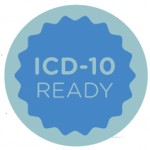The CMS has also been clear that although Medicare is allowing an implementation period, third-party payers are not beholden to the same requirement.
“Unfortunately the guidance does not apply to private payers,” Dr. Harvey said. “So the average physician who has a payer mix including private payers will still be responsible for specificity. We certainly hope that private payers will follow the lead of CMS, but that remains to be seen.”
Similarly, the guidance does not change the coding specificity required by the local coverage determinations (LCDs) or national coverage determinations (NCDs), and claims may be denied because the ICD-10 code is not consistent with an applicable LCD or NCD policy.
Resources & Testing
“Recognizing that health-care providers need help with the transition, CMS and AMA are working to make sure physicians and other providers are ready ahead of the transition,” according to the CMS/AMA statement. Available resources include the following:
- The ACR’s ICD-10 page, which includes information about workshops and implementation resources;
- The Road to 10 site, which includes primers for clinical documentation, clinical scenarios and other specialty-specific resources targeted to physicians in smaller practices;
- The provider resources page, which includes videos, a quick-start guide, infographics and numerous links to additional educational websites; and
- A complete list of the 2016 ICD-10-CM valid codes and code titles.
To help ensure viability of its systems, the CMS has finished its three planned end-to-end testing rounds and will offer ongoing Medicare acknowledgment testing for providers through Sept. 30.
Although the first round of testing wasn’t stellar, the second round of testing3 was better and “had good results, suggesting minimal technical challenges directly attributable to ICD-10 codes,” Dr. Harvey says. “Though July testing results are not out yet [as of Aug. 3], this does raise our confidence level for those practices who upgraded systems. There are still some out there, however, who are waiting for delivery of upgrades, and that could still pose a risk.”
To address physician concerns and answer questions about claims submission, CMS is creating an ICD-10 communications and coordination center and appointing an ICD-10 ombudsman as part of the guidance. The ombudsman is set to be appointed before go-live.
Kimberly J. Retzlaff is a freelance medical journalist based in Denver.
References
- Centers for Medicare & Medicaid Services. CMS and AMA announce efforts to help providers get ready for ICD-10: Frequently asked questions. 2015 August.
- Harvey W. CMS acts on the ACR’s requests and announces ICD-10 grace period. The Rheumatologist. 2015 July 14.
- California HealthCare Foundation. CMS: 88% of claims approved in latest ICD-10 end-to-end testing. iHealthBeat. 2015 June 2.

